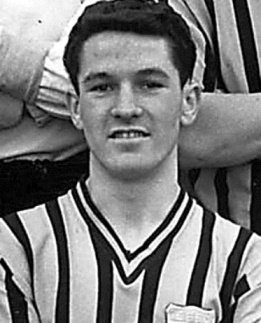Kirkcaldy born George Yardley was signed by East Fife as an amateur from Frances Colliery juniors on 10th August 1959 as an understudy to regular goalkeeper Ronnie McCluskey. To say that the sixteen-year-old was a versatile player was an understatement to say the least, as George had turned out for his previous club as both goalkeeper and centre-forward!
The reason for the youngster’s ability to play in two vert different positions was rooted in his school football days. Initially turning out as a goalkeeper for Dunnikier Primary School, George was forced to give up that position after stepping up to Templehall secondary, where the ‘keepers position in the school team had already been filled.
Forced to play outfield, the young Yardley still managed to establish himself as a skilful player with the school side as well as with Abbotshall Boys Brigade and Novar Star, and eventually his skills came to the attention of the junior clubs. George was eventually signed by local junior outfit Frances Colliery, for whom he played primarily as a centre-forward, but filled the goalkeeper’s position as and when required.
During his first season at Bayview, George made no competitive appearances for East Fife, which is hardly surprising given his tender years. In fact, when regular ‘keeper Ronnie McCluskey suffered a broken finger the League Cup quarter final against Cowdenbeath in September 1959, East Fife decided to bring back veteran ‘keeper Bert Allan to cover the position rather than risk the sixteen-year-old between the sticks.
George did make one goalkeeper appearance during that first season, however, when he filled that position for a home friendly against the British Army at Bayview on Tuesday 20th October 1959, less than a fortnight after his seventeenth birthday. Two months later, the Fife faithful were treated to a demonstration of the player’s versatility when he turned out as centre-forward for a friendly against the Scottish Amateur XI at Bayview.
Despite having played no competitive matches to date as a goalkeeper for East Fife, George was selected to play I goals for Scotland against Wales in the British Amateur Championship international at Rugby Park, Kilmarnock on 5th March 1960, where he lined up alongside Methilhill Strollers’ left-bac James Field. Also, appearing for Scotland that afternoon was none other than Queen’s Park’s Alexander campaign Ferguson, the player who was destined to become one of Manchester United greatest-ever Manager following a long and successful career with several Scottish clubs.
Conditions were perfect as the match got underway, and the Welsh soon had the Scot’ goal under pressure, with Gorge called into action during the early stages to save bravely at the feet of Wales’ outside-left Pierce. As the visitor s piles pressure on the home goal, the East Fife man was called into action on several occasions, and did well to deny Pierce yet again as the half progressed. Eventually, the Scots stepped up their game, and before half-an-hour had been played they had established a two-nil lead through Alex Ferguson and Montrose’s Kenny McLeod. The Welsh were still very much in the fame, however, and George Yardley was eventually beaten ten minutes before the interval when Davies reduced the leeway.
The visitors started the second half just as they had started the first, and took control of the game once again, with the East Fife man called into action on several occasions to prevent the Welsh equalising. Following some slack play from the home defence, George was forced to save at full length to deny Wales’ left-back Williams, but the Welshman was no to be denied, and in fifty-four minutes brought the sides level when he fired in a daisy-cutter into the net from a tight angle. The res of the match was played out in an even keel, with the home side netting again through Stenhousemuir’s Boston Clegg and the visitor’s through another William’s strike, to make the final score all-square at three goals apiece.
Following such an impressive international debut, it was widely expected theta George Yardley would retain his place in the side, but unfortunately a broken finger sustained shortly after this match out paid to any such hopes.
George eventually made his completive debut for East Fife in a league match against Stranraer at Stair Park on 20th August 1960, when he replaced Bert Allan in goal as the Fife attempted to halt a run of six consecutive league defeats. The match ended all-square at 2-2, but despite George playing his part in halting the run of defeats, Bert Allan was re-instated the following week and retained his goalkeeper’s position for the remainder of the season.
In December 1960, following another run of defeats, George was brought back into the first team as centre-forward, and played a huge part in East Fife’s record demolition of East Stirlingshire by eight-goals-to-one, despite failing to find the net himself. He went on to establish himself as the regular number nine, and scored his first goals for the club when be bagged a brace in a 3-1 home victory over Alloa Athletic on the last day of the year.
George ran up a tally of ten goals before the season was out, and retained his position leading the attack for most of the following season before being asked to fill the position of goalkeeper once again during the latter stages of the campaign following an injury to regular ‘keeper Bobby Danskin.
George remained at Bayview and flitted between the positions of centre-forward and goalkeeper until October 1963, when he was transferred to Forfar athletic for a short spell before moving on just weeks later top Montrose. After being handed a free transfer by the Gable Endies at the end of 1963/64 season, the player decided to to try his luck in the southern hemisphere and duly signed for Australian side St. George Budapest, where he remined until returning to the United Kingdom to play one trial match with Luton Town.
It was Tranmere Rovers who eventually landed his signature, however, and George went on to establish himself as a firm favourite at Prenton Park, where he made122 appearances over four seasons, scoring sixty-eight goals, before ending his playing career with non-league side Altringham.
He also managed to return to Australia during the summer months to turn out for St. George Budapest on a further two occasions during this period.
Jim Corstorphine

